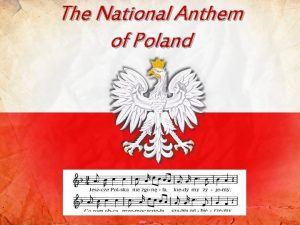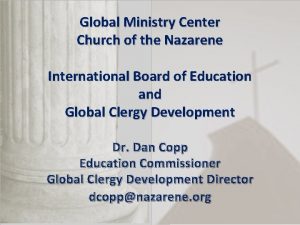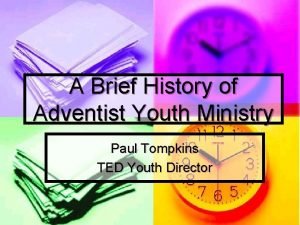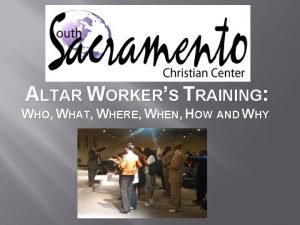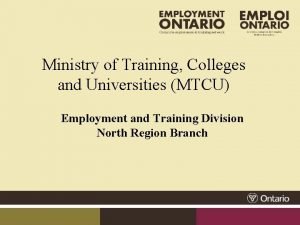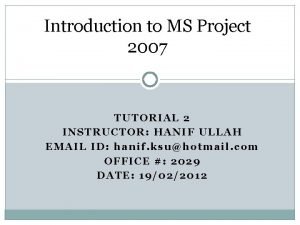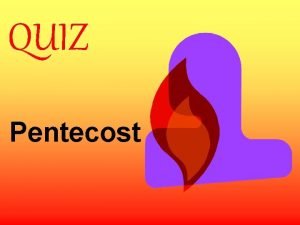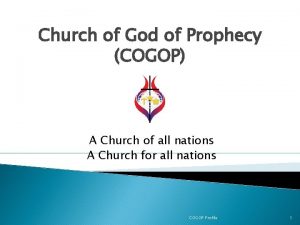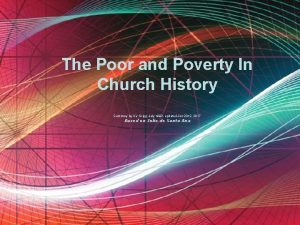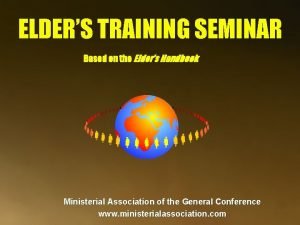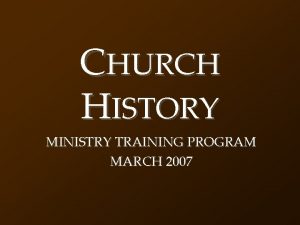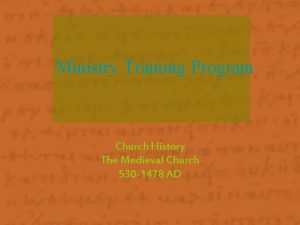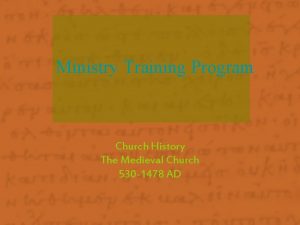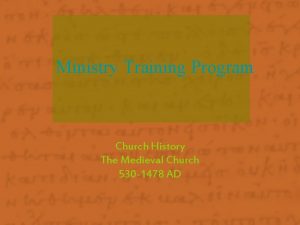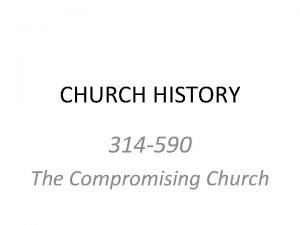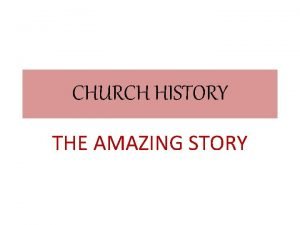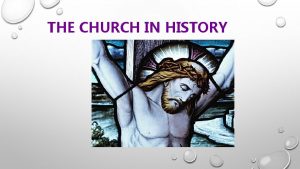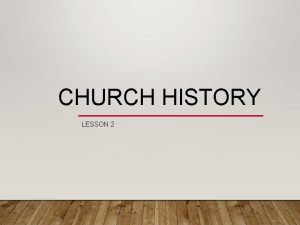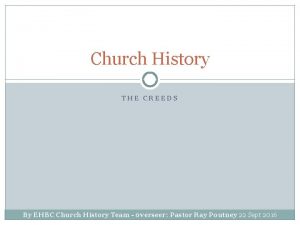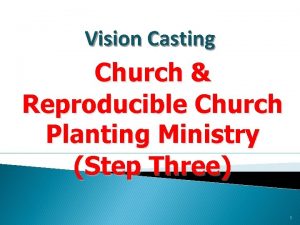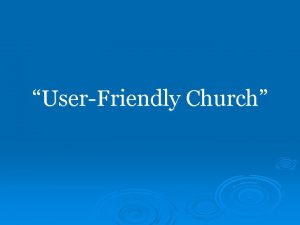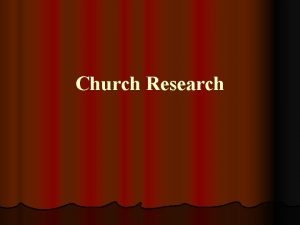CHURCH HISTORY MINISTRY TRAINING PROGRAM MARCH 2007 THE












































- Slides: 44

CHURCH HISTORY MINISTRY TRAINING PROGRAM MARCH 2007

THE REFORMATION CHURCH HISTORY MTP I MARCH 2007

THE REFORMATION 1510 1520 1530 1540 1550

PRE-REFORMATION CHRISTIANITY • The Landscape of Early Medieval Life • Christianity on the Eve of the Reformation • Christian Humanism

POPE LEO X • Giovanni de Medici • Pope Leo X 1513 -1521 • "Since God has given us the papacy, let us enjoy it. " • His Extravagance offended Cardinals who plotted assassination (but alas they fell victim to food poisoning) • Sold Offices and Indulgences to pay for St. Peter’s

CHRISTIAN HUMANISM • Ad Fontes (Primary Sources) • Sought Learning not for Knowledge but for Morality and Virtue • For Christianity, ad fontes means back to the Bible and Early Church Fathers • Most important humanist: Desiderius Erasmus

DESIDERIUS ERASMUS • • • 1466 -1536 Greatest Scholar of early 1500 s Moralizing Reformer – Neo Platonic view of humans – Urged Moral Mastery • Satirist – Praise of Folly (1511) – Critic of Superstition, Privilege, Scholasticism, Hypocrisy, Corruption • Biblical Scholar – Published Greek NT 1516 with his own Latin parallel (a very dangerous translation for Metanoia/Paenitentia) • “Laid the Egg that Luther would hatch”

MARTIN LUTHER – EARLY YEARS • 1483 -1546; Born to a German coal miner • Early Education on a road to Law (with an emphasis on Nominalism) at University of Erfurt • Enters Augustinian Monastery in Erfurt, the strictest order (after a thunder storm) • Extraordinarily Self Aware and Scrutinizing

MARTIN LUTHER- SEEDS OF REFORM • Pilgrimage to Rome • Indulgences: not a matter of buying one’s way into heaven, but a satisfaction for one’s penance. • Tetzel on a campaign for St. Peter’s of Rome. • Luther feels souls are being misled by the indulgences campaign. • He draws up 95 theses for debate. • He tells Tetzel to change – not to stop – his indulgences practice.

LUTHER POSTS HIS 95 THESES • The Disputation of Martin Luther on the Power and Efficacy of Indulgences • October 31, 1517 • Church Door at Wittenberg • Translated and Published without Luther’s consent • Catapulted Luther to prominence

1517 -1521 Path to Public Figure • 95 Theses first brings Luther to public attention • Humanists bring him to prominence • Theses are translated into German and widely published (without his consent) • Humanists promote the 95 theses for their own agenda • Luther doesn’t want to attack the church • Luther will not recant unless shown by Scripture rather than by Canon law • He gets tipped off that he will be brought to Rome, but Luther flees • Eck vs. Luther debate pushes Luther into a corner that Luther would not have gone without the push • Luther supports neither councils nor popes but the authority of scripture is alone authoritative for Christian life • Response: Pope Leo X gives Luther 60 days to recant or face a final excommunication. Papal bull exsurge domine • Luther responds with three treatises, including the Address to the Christian Nobility of the German Nation, Babylonian Captivity of the Church (in Latin) to reform the church’s worship and sacraments to Baptism, communion, and penance. The Freedom of the Christian which addresses the issue of faith and works.

DIET OF WORMS 1521


• • • LUTHER’S THEOLOGY Emerged gradually from 1513 -1519 Sole Fide Sola Scriptura Priesthood of all believers Extremely passionate, gritty communicator… to move people, appealing to the heart and the head • Fills 100 thick volumes in writing • 3 Misconceptions – Private interpretation; no subjective truth (not even his), just THE truth – Sought primarily to correct abuses in the church. He rejected the church because of root causes of doctrinal error. It was inherently perverted in that humans can contribute to their salvation. Abuses were merely symptoms of the root cause – Sought to establish his own church. Could not be more than one more genuine Christian church. He was calling the one and only church back. He concludes that Leo X’s rejection of his propositions showed that Christ’s return was close as the church had been taken over by the anti-Christ.

LUTHER VS. ERASMUS • Initially public considered both on the same mission • Similarities can’t disguise the profound differences – Gradual process of improvement – Luther’s view of human nature was much less optimistic – Reckless vs. deliberative • Erasmus pens “On the Freedom of the Will” almost against his own will. Very moderately and carefully crafted. • Luther issues “On the Bondage of the Will, ” a fierce attack on Erasmus. – This is the real crux of the matter – Any degree of human contribution robs God of his omnipotence. Takes salvation out of God’s hands. – Are we saving ourselves? Then what’s the point of God? • Catholic Humanists and Protestant Reformers would never collaborate from this point forward

HULDRYCH ZWINGLI • 1484 -1531 • Native of the Swiss confederation • Priest in Zurich • Admired Humanism • Expository Preacher • Phases out Catholicism with city council of Zurich • Marburg Colloquy 1529 • Dies in Battle of Kappel

• • PROTEST SPREADS How did the message spread? – – Printed Word Visual Images Spoken Word!!! Hybrid How did the movement spread? 4 stages: 1. Humanist enthusiasm and early support 2. Street preachers and ambiguous magistrates despite Catholic complaints 3. Middle strata of society acts for change 4. Magistrates, facing loss of control, call for a council (which are a foregone conclusion in a city already straining toward reform)

• • • THE PEASANTS’ WAR 1524 -1525 from France to Austria. Not a single organized movement It was crushed A vision of reform closer to Zwingli rather than Luther The peasant work boot was its banner of grievance against oppression Thomas Muntzer was actively apocalyptic (while Luther was passively apocalyptic) • Call to Usher in the new kingdom of righteousness; led 9000 into battle of Frankenhausen with farm tools to a complete butchering at the hands of armored cavalry despites assurances that they could not fail. • Results: – Marks the end of the Reformation as a mass social movement from “below. ” – Stigmatizes religious radicalism (even by Luther) and preserves secular authority. – Assures that implementation of the reformation would proceed in a controlled, domesticated way in accord with the political authorities.

HENRY VIII • 1491 -1547 • Auspicious Start • “Defender of the Faith” 1521 • Catherine of Aragon • The Act of Supremacy 1534 • Anne Boleyn • Jane Seymour • Thomas Cranmer

JOHN CALVIN • 1509 -1564 • Brilliant student of law in Paris • 1533 “Sudden Conversion” • 1536 Publishes The Institutes of Christian Religion (Principles of the Christian Faith) • TULIP • Geneva – Moral Magnet • Enduring Influence

JACOB ARMINIUS • 1560 -1609 • Studied under Theodore Beza at Geneva 1582 • Ordained to pastor Amsterdam 1588 • In attempting to defend Calvinistic predestination against the onslaughts of Dirck Volckertszoon Coornhert, modified his view to Predestination based on Divine Foreknowledge • Remonstrant's Five Articles of 1610 led to TULIP response by Calvinists

THE RADICAL REFORMATION The Rise of the Anabaptists 1525 -1534

Dirk Willems turning to save the life of the drowning deputy who had been sent to arrest him. Despite his act of Christian love, the Catholic authorities still ordered the deputy to arrest Dirk, who they later burned at the stake.

RADICAL REFORMATION • Arose among Zwingli’s own colleagues • 1523 They drew different conclusions and suspected Zwingli of selling out to city magistrates (on tithes and pace of reform) • Central issue: if one is saved by faith alone, what sense did it make to administer baptism to a pre-cognitive infant

THE SWISS BRETHREN: FELIX MANZ & CONRAD GREBEL

THE BAPTISM DEBATE • 1524 Conrad Grebel and Felix Manz argued from Scripture (Mark 16: 16). First have faith and only then be baptized. No explicit mandate infant baptism can be found in Scripture Alone … so who is really holding to Sola Scriptura? • Zwingli was compelled to argue on the basis of analogy from circumcision in the OT. • Why did the issue of infant baptism matter so much? – Rite of passage into the community – Citizenship was the other side of the coin for fellowship for Zwingli – It’s like getting a “rock wet” according to Anabaptists • January 1525 they defy the city’s infant baptism law

OTHER ISSUES • Radical non resistance… “turn the other cheek; do not resist an evil person” • Doing away with ordinary vs. extraordinary believers (like the Voluntarily Devout and their “On the Imitation of Christ”) • A literal following after the Christ in Discipleship… only true followers can be Christians • Accused Luther of a cheap Christianity that let Christians off the hook • Separatism results from persecution (a product of the Peasants’ War)… no oaths to government… starts to look like the peasants of 1524. • Swiss Brethren, South German/Austrian Anabaptists, and Hutterites (communities in Moravia and Bohemia)

MUNSTER DEBACLE 1534 • Eschatological Anabaptists attempted to establish a Theocracy in this northern German town • “New Jerusalem” complete with King David • Polygamy, Community of Goods, Chiliasm • Permanently Discredited Mainstream Anabaptists • Dead bodies hung in cages from St. Lamberts

MENNO SIMMONS • 1496 -1561; Ordained 1524 • Priestly doubts 1531 -36 • Mennonites take their name from him • Salvaged the non resistant, Biblically based Anabaptist vision of a disciplined church • 1 Corinthians 3: 11 • “True Repentance” • “Under the Ban” 1557

REFORMATION SPREADS OUT OF CENTRAL EUROPE • Does not take off until the 1550 s (all remained overwhelming Catholic) • The Low Countries (Netherlands, Holland, and Flanders) – Highly literate, urban population… ideas spread – Strong Humanism centers (Erasmus’ home) – Augustinian monasteries helped spread Luther’s ideas (first two Protestant martyrs) • France • England

CATHOLIC CHURCH REFORMS The Counter Reformation 1540 -1563

IGNATIUS LOYOLA • 1491 -1556 • Fascinated by Holy Chivalry • Fierce Asceticism proved formative • Formed a small band (including Francis Xavier) bound to poverty, chastity, and obedience • “Society of Jesus” or Jesuits 1540 • Spiritual Exercises

COUNCIL OF TRENT 1545

COUNCIL OF TRENT • The Catholic Reformation or Counter. Reformation called in 1537 but delayed 8 years • Pope Paul III Commissions Concerning the Reform of the Church – Popes and cardinals had become too worldly; – bribery to gain church office was widespread; – monasteries had lost their discipline; – and the selling of indulgences was widely abused.

COUNCIL OF TRENT • Resolutions – Reform!!! Abolished Indulgence sellers, Clerical Corruption, Favors to Relatives, Mistresses – Reaffirmation!!! Seven Sacraments, Transubstantiation, Latin Mass, Sacrificial Understanding of Mass, Justification was NOT by Faith Alone, Latin Vulgate Bible, No Private Interpretation, Sola Scriptura denied, Church exists before Scriptures • Results – Brought Much Needed Reform – Cemented the Gulf Between Catholics and Protestants – Defined the Church through Vatican II in 1960 s

WERE THE REFORMATIONS A SUCCESS? • Christendom View: – No one wanted division, but unified doctrine and worship; No group got what they wanted – Endless doctrinal controversies and religious wars; anti authoritarianism; moral laxity • Respective Traditions’ Views: – Protestants’ ultimate goal of eternal salvation of Christian men and women… immeasurable, but most rural adherents were ignorant of the basics of the faith – Catholicism redirected rather uprooted personal piety – Anabaptism was most successful since it was “self selecting. ” Other devout minorities also flourished and exercised vastly disproportionate historic influence

REFORMATION’S LEGACY • Transformation of the Western World • Multiplicity of Churches • Doctrinal Pluralism… eventually Relativism • Increasingly Secular Political Order • Diminishing Influence of Religion in Public Life • Domesticated and Marginalized Christianity for the sake of Social and Political Coexistence

THE AGE OF REASON CHURCH HISTORY MTP I MARCH 2007

THE AGE OF REASON 1670 1690 1710 1730 1750 1770

AGE OF REASON • Response to Sectarian Violence of 1600 s • Sir Francis Bacon – Scientific Method • Blaise Pascal – The Wager • Sir Isaac Newton – Natural Laws • John Locke – Christian Basis for Unity based on Reasonable Principles

JOHN LOCKE • Supernatural Rationalist who sought to promote unity in Europe via a common sense reasonable approach to understanding the Gospel • The Reasonableness of Christianity (2 essentials): – Belief in Jesus as Messiah – Obedience to clear commands • He influences the Hermeneutics of Restorationists

GREAT AWAKENING

JONATHAN EDWARDS • 1703 -1758 • “Greatest American Mind” • Northampton, Mass • Dispassionate Revivalist who sparked The Great Awakening (despite Enlightenment’s deemphasis on supernatural) • “Sinners in the Hand of an Angry God” • Freedom of the Will 1754 on divine sovereignty • President of Princeton

Alexander Campbell • Scottish Irish Background • Thomas Campbell, his Father, and he both emigrate to US in 1807 and both break with the Presbyterian Church • Unites with Barton Stone and Walter Scott to form Churches of Christ
 Poland national anthem lyrics
Poland national anthem lyrics Church of the nazarene global ministry center
Church of the nazarene global ministry center History of youth ministry
History of youth ministry Altar workers
Altar workers Prison ministry training manual download
Prison ministry training manual download Mtcu
Mtcu Ministry of education secondary engagement program
Ministry of education secondary engagement program Project 2007 tutorial
Project 2007 tutorial Office 2007 training
Office 2007 training Project 2007 tutorial
Project 2007 tutorial Quiz questions on the history of the church of pentecost
Quiz questions on the history of the church of pentecost Logo cogop
Logo cogop History of the church summary
History of the church summary Elders handbook
Elders handbook Hình ảnh bộ gõ cơ thể búng tay
Hình ảnh bộ gõ cơ thể búng tay Slidetodoc
Slidetodoc Bổ thể
Bổ thể Tỉ lệ cơ thể trẻ em
Tỉ lệ cơ thể trẻ em Chó sói
Chó sói Tư thế worm breton là gì
Tư thế worm breton là gì Chúa yêu trần thế alleluia
Chúa yêu trần thế alleluia Môn thể thao bắt đầu bằng chữ đua
Môn thể thao bắt đầu bằng chữ đua Thế nào là hệ số cao nhất
Thế nào là hệ số cao nhất Các châu lục và đại dương trên thế giới
Các châu lục và đại dương trên thế giới Công thức tính thế năng
Công thức tính thế năng Trời xanh đây là của chúng ta thể thơ
Trời xanh đây là của chúng ta thể thơ Cách giải mật thư tọa độ
Cách giải mật thư tọa độ Làm thế nào để 102-1=99
Làm thế nào để 102-1=99 độ dài liên kết
độ dài liên kết Các châu lục và đại dương trên thế giới
Các châu lục và đại dương trên thế giới Thể thơ truyền thống
Thể thơ truyền thống Quá trình desamine hóa có thể tạo ra
Quá trình desamine hóa có thể tạo ra Một số thể thơ truyền thống
Một số thể thơ truyền thống Cái miệng nó xinh thế chỉ nói điều hay thôi
Cái miệng nó xinh thế chỉ nói điều hay thôi Vẽ hình chiếu vuông góc của vật thể sau
Vẽ hình chiếu vuông góc của vật thể sau Biện pháp chống mỏi cơ
Biện pháp chống mỏi cơ đặc điểm cơ thể của người tối cổ
đặc điểm cơ thể của người tối cổ Thế nào là giọng cùng tên?
Thế nào là giọng cùng tên? Vẽ hình chiếu đứng bằng cạnh của vật thể
Vẽ hình chiếu đứng bằng cạnh của vật thể Tia chieu sa te
Tia chieu sa te Thẻ vin
Thẻ vin đại từ thay thế
đại từ thay thế điện thế nghỉ
điện thế nghỉ Tư thế ngồi viết
Tư thế ngồi viết Diễn thế sinh thái là
Diễn thế sinh thái là
